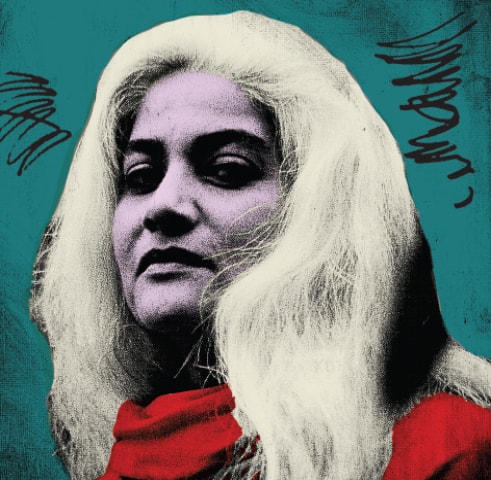
“0 to 60 in Five Seconds;” “Drive it Like You Stole it;” “Lose Your Innocence in 3.9 Seconds” — these are typical marketing slogans for the latest car models.
And then a Honda 70 motorcycle has a flamboyant message in reflective stickers on a shiny CD number plate that says “Chal Nikal” (let’s get out of here). It is a collective call to escape, to get out of an impasse, find one’s own way out. Somewhere in this contrast lie the social challenges of Pakistani society.
The global image of the biker: outlaw by choice, unfettered by society’s docile norms, is a far cry from bikers in Pakistan and most developing countries, where the motorcycle is simply the most affordable form of transport. According to Arif Hasan, the famous urban planner, the monthly costs of riding a motorbike are half of bus fares and cut travel time in half.
American WWII veterans wanting to relive the camaraderie of the shared dangers of the battlefield, formed some of the first Harley Davidson biker clubs that evolved into the “Hell’s Angels” — a name used by air force squadrons in war, which in turn were inspired by Howard Hughes’ 1930s film, Hell’s Angels, eulogising death-defying WWI pilots.
Joe Moran calls motorways “long periods of boredom punctuated by brief moments of life-threatening danger.”
The image of the outlaw biker was established for all time with the film poster of The Wild One – Marlon Brando leaning forward on his bike, clad in leather jacket and a fisherman captain’s hat set at a rakish angle. The film was banned in Britain for 14 years but that did not stop a cult following including James Dean and Elvis Presley. The Rebel Without a Cause, the title of a James Dean film, reflects Brando’s most-quoted line in The Wild One, when Mildred asks, “Hey Johnny, what are you rebelling against?” to which he famously replies “Whadda you got?”
Today, Hell’s Angels have shed their image of violence other than a don’t-mess-with-me persona. They are more likely to be leather-clad family men and women, having reunions and weekend bike rides across the great yonder.
Pakistan has a few bikers’ clubs, including a female riders’ club, the “Rowdy Bikers”, whose main activities are admiring each other’s bikes, touring the untouched North or, in the case of women, challenging stereotypes. The majority of the seven million bikers in Pakistan are simply biking to work or taking the entire family precariously balanced to visit relatives, or on mall outings.
Who in urban Pakistan has not sworn at the intrepid biker weaving recklessly through traffic, breaking red lights, going the wrong way and turning into a main road at top speed? If there is an accident, as often happens, all the bikers gather in support, sometimes resulting in the supposed offending vehicle being set on fire. These are ordinary people: plumbers, office workers and shopkeepers; people who, in another context, would be extremely polite and generous.
Joe Moran in his fascinating history of roads in Britain, On Roads: A Hidden History suggests the road is like a separate country with its own unwritten laws, rituals and codes of behaviour with each driver “following their own self-absorbed agendas.” He refers to straight roads as a symbol of political coercion, and built to facilitate the powerful, a national symbol of virility and modernity.
Moran calls motorways “long periods of boredom punctuated by brief moments of life-threatening danger.” Conversely in Pakistan, roads are eventful, unpredictable and chaotic spaces, forcing pedestrians and drivers to invent their own navigational systems. The recent spate of roadworks initiated with no pre-marked diversions, leave in their wake distressed drivers reversing out of one dead-end or the other in their search for alternate routes.
This is symptomatic of the lack of governance, leaving citizens to solve their own problems. The Pakistani biker represents an ignored social class struggling for survival. Bikers truly believe traffic rules are meant for cars, buses and trucks, not their small ‘invisible’ motorcycles. The motorist is resented for having access to greater comfort or scorned for not facing life’s hazards the way a biker does.
Steven Alford sees the motorcycle as a significant cultural symbol representing alienation and opposition to authority. “The motorcycle allows riders to flaunt a lack of concern with the constraints of society,” writes Michel de Certeau in his book The Practice of Everyday. Certeau speaks of Everyman, the Nobody who is like “the straying of writing outside of its own place”, who claims exemption from any blame, who has a mad and lucid wisdom and anonymous laughter. He has to believe providence (God) is looking after him. Mobility brings Everyman and Nobody to a place previously excluded, now able to join the narrative. The city is designed by planners who produce maps that describe the city as a unified whole. The users find their shortcuts, disrupt its planned grid — “everyday life works by a process of poaching on the territory of others.”
A drawing exercise I give students is to make lines descriptive of how different vehicles move on the road. They make heavy steady lines for trucks, fine graceful lines for cars, lines for rickshaws that constantly change direction, fine meandering lines for bicycles and fast careering lines for motorcycles weaving across all.
The Chal Nikal strategy is poised to spread across all the lanes of Pakistani society as 7,000 new motorcycles are registered daily — far more than cars — while mass transit (read good governance) remains a tangled nightmare.
Durriya Kazi is a Karachi-based artist and heads the department of visual studies at the University of Karachi
Email: durriyakazi1918@gmail.com
Published in Dawn, EOS, April 8th, 2018















































Dear visitor, the comments section is undergoing an overhaul and will return soon.